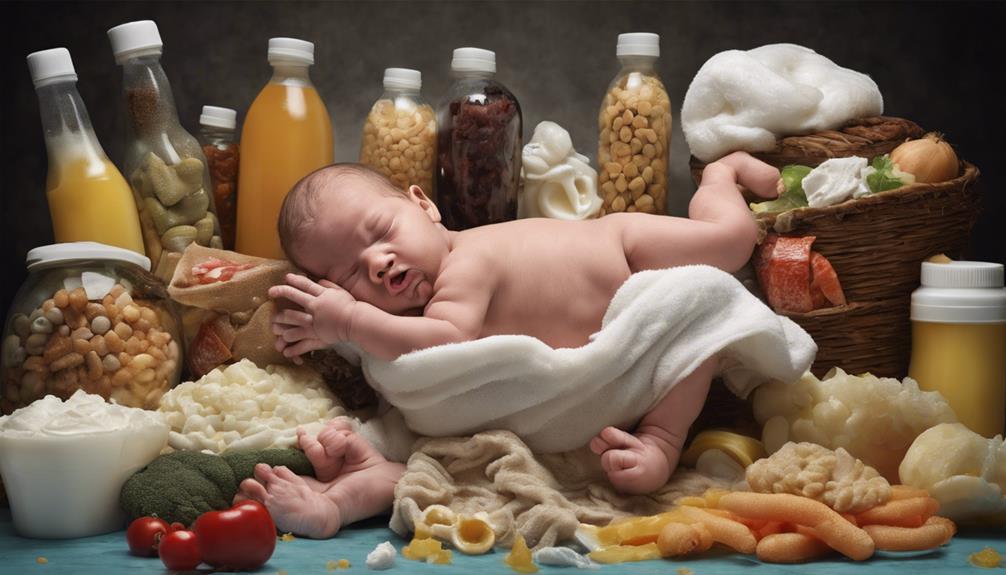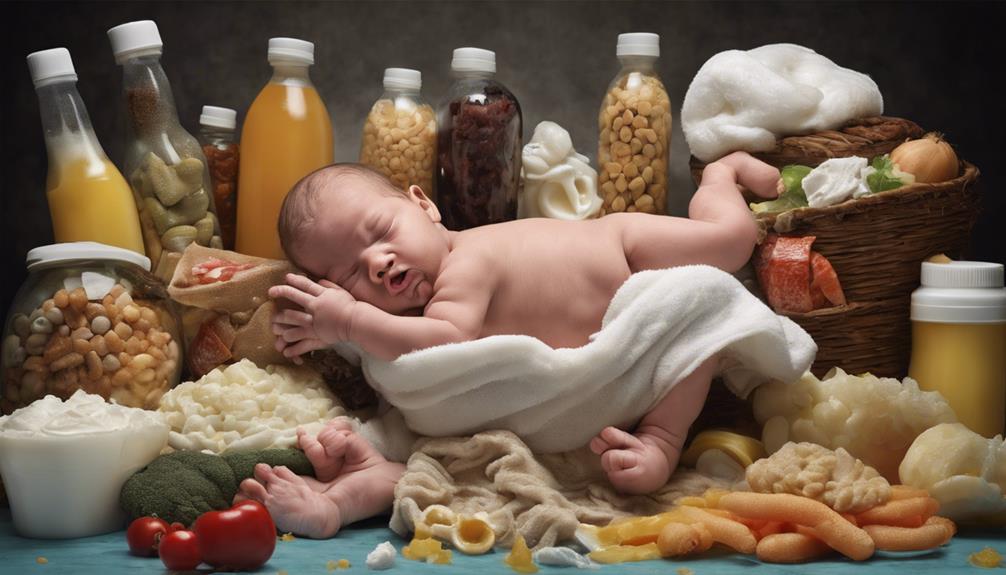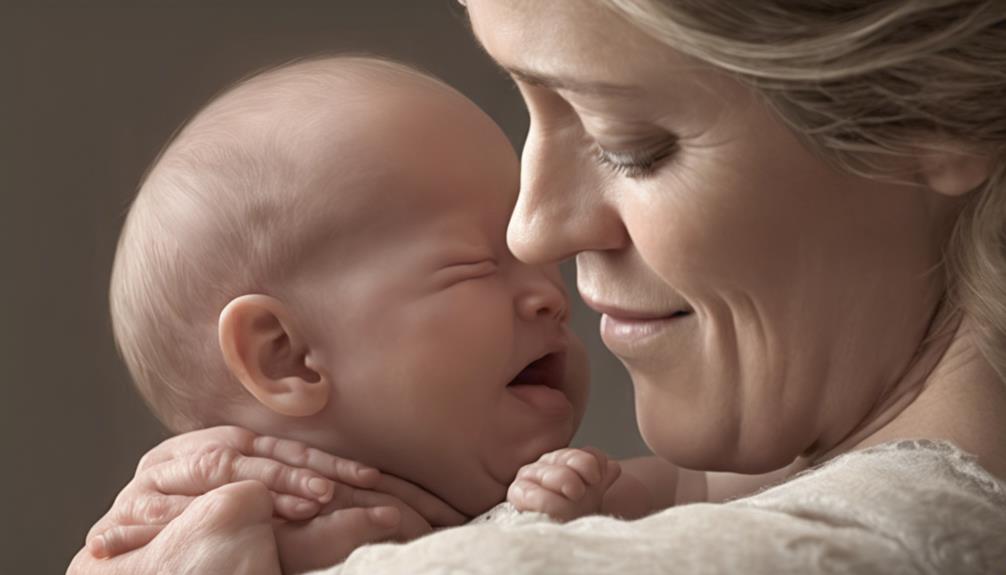Let's dip our toes into the murky waters of newborn bowel movements. Just when you thought you had it all figured out, your little one surprises you with foamy poop.
But fret not, as we unravel the mysterious causes behind this bubbly phenomenon. From malabsorption disorders to infections lurking in the gastrointestinal tract, our investigation into the world of newborn foamy poop promises eye-opening insights.
So, what could be causing these unexpected bubbles? Stay tuned for a closer look at the five potential culprits.
Key Takeaways
- Malabsorption disorders like celiac disease can lead to foamy poop in newborns with greasy, pale stools.
- Pancreatitis can cause foamy, greasy stools due to impaired fat digestion and nutrient absorption.
- Infections such as bacterial, parasitic, or viral can disrupt the digestive system balance, resulting in foamy stools.
- Irritable Bowel Syndrome (IBS) may contribute to foamy poop with increased mucus, changes in bowel habits, and excessive gas production.
Malabsorption Disorders
Malabsorption disorders, such as celiac disease, can cause foamy poop in newborns due to their inability to effectively absorb nutrients from food. When newborns experience malabsorption issues, their digestive systems struggle to break down and absorb essential nutrients. This leads to foamy stools that may be greasy and pale in color, indicating a lack of proper nutrient absorption, especially fats. The stools might appear bulky and have a foul smell due to the presence of undigested food particles. These gastrointestinal issues can greatly impact the newborn's digestive health and overall well-being.
Identifying foamy poop in newborns as a potential symptom of malabsorption disorders is important for their medical evaluation. Early detection and diagnosis can help healthcare providers intervene promptly to manage the condition effectively. Hence, if parents notice persistent foamy stools in their newborn, seeking a medical evaluation is essential to address any underlying malabsorption issues and make sure the baby's digestive system functions optimally.
Pancreatitis
Pancreatitis in newborns presents as an inflammatory condition affecting the pancreas, resulting in digestive complications such as foamy stools. When dealing with pancreatitis in newborns, it's important to take into account the following key points:
- Symptoms of Pancreatitis: Newborns with pancreatitis may exhibit symptoms like foamy, greasy, and foul-smelling stools due to impaired fat digestion. These digestive issues can be indicative of underlying pancreatic inflammation.
- Impaired Nutrients Absorption: Pancreatitis can interfere with a newborn's ability to properly absorb essential nutrients from their diet. This impaired absorption can contribute to the development of foamy poop and other complications related to malnutrition.
- Treatment and Medical Evaluation: Managing pancreatitis in newborns involves treating symptoms, providing digestive enzymes to aid in food breakdown, and addressing any underlying factors contributing to the condition. Prompt medical evaluation is important to initiate appropriate treatment and prevent long-term consequences on the newborn's health.
Infections
In newborns, gastrointestinal infections, whether bacterial, parasitic, or viral, can be a significant factor leading to the presence of foamy poop. Gastrointestinal infections such as salmonella or rotavirus can disrupt the delicate balance of the digestive system, resulting in foamy stools with gas bubbles. This can be alarming for parents, as foamy poop in newborns might indicate an infection that requires prompt medical attention. Identifying the specific infection causing foamy poop is vital for effective treatment and management in newborns. Here is a table outlining some key points regarding infections and foamy poop in newborns:
| Infections and Foamy Poop in Newborns |
|---|
| Bacterial Infections (e.g., Salmonella) |
| Viral Infections (e.g., Rotavirus) |
| Prompt Medical Attention and Treatment |
Understanding the link between infections and foamy poop is essential for ensuring the well-being of newborns and providing appropriate care. If you notice foamy stools in your newborn, seeking medical advice promptly is advisable.
Irritable Bowel Syndrome

Irritable Bowel Syndrome, a common gastrointestinal condition, presents with symptoms such as abdominal pain, bloating, and changes in bowel habits. When it comes to a baby's stool, IBS can manifest in various ways, including foamy poop. Here are some key points to understand about IBS in relation to foamy stool:
- Mucus Presence: IBS may lead to increased mucus in the stool, which can contribute to its foamy appearance.
- Altered Bowel Habits: Babies with IBS might experience changes in their bowel habits, such as diarrhea or constipation, which can affect the consistency of their stool.
- Excessive Gas: IBS can cause excessive gas production in the intestines, leading to bubbles in the stool that create a foamy texture.
If a baby's stool consistently appears foamy and other symptoms like abdominal pain or unusual bowel habits are present, a medical evaluation for IBS and appropriate diagnosis is essential for proper management.
Abdominal Surgeries
After undergoing abdominal surgeries, newborns may experience disruptions in their normal digestive processes, potentially leading to the presence of foamy poop. Surgical procedures like appendicectomy or bowel surgeries can impact the absorption of nutrients, causing changes in stool consistency. Complications from abdominal surgeries, such as altered gut motility or changes in enzyme production, may contribute to foamy bowel movements in newborns. Post-surgery care and monitoring are essential to address any digestive issues that could result in foamy poop in newborns. Consultation with healthcare providers is crucial for proper management of gastrointestinal concerns following abdominal surgeries in newborns.
| Aspect | Impact |
|---|---|
| Nutrient Absorption | Disrupted, leading to changes in stool consistency |
| Gut Motility | Altered, potentially contributing to foamy poop |
| Enzyme Production | Changes may affect digestive processes |
| Post-Surgery Care | Essential for addressing digestive issues post-abdominal surgery |
| Healthcare Providers | Consulting them is crucial for managing gastrointestinal concerns after abdominal surgeries in newborns |
Frequently Asked Questions
Why Does My Newborn Have Foamy Poop?
We noticed our newborn's foamy poop, which might be from lactose overload, undigested proteins, or air swallowing during feeding. It could suggest an immature digestive system adjusting to the diet. Consulting a pediatrician is wise for persistent issues.
What Does Foamy Stool Indicate?
Foamy stool in newborns may signal digestive issues like malabsorption, infections, or dietary problems. It's important to monitor frequency, consistency, and color for potential health concerns. Medical evaluation might be needed for proper diagnosis and treatment.
Why Is My Poop Frothy When Breastfeeding?
When breastfeeding, frothy poop can occur due to lactose overload. This happens when the baby consumes too much foremilk with lactose and not enough hindmilk rich in fat. Adjusting breastfeeding techniques and seeking professional help can resolve this issue.
Does Lactose Intolerance Cause Foamy Stool?
Yes, lactose intolerance can cause foamy stool in newborns. Lack of lactase enzyme leads to poor lactose breakdown, resulting in gas, bloating, and frothy stools. Consult a healthcare provider for diagnosis and consider dietary adjustments or lactose-free formulas for management.
Conclusion
To wrap up, the reasons for foamy poop in newborns are varied and complex. It's essential to address these underlying issues promptly to guarantee the baby's health and well-being.
However, there's one surprising factor that's often overlooked in this situation, which could shed light on a potential solution to this common problem.
Stay tuned for our upcoming article where we reveal this unexpected cause and its implications for managing foamy bowel movements in newborns.









